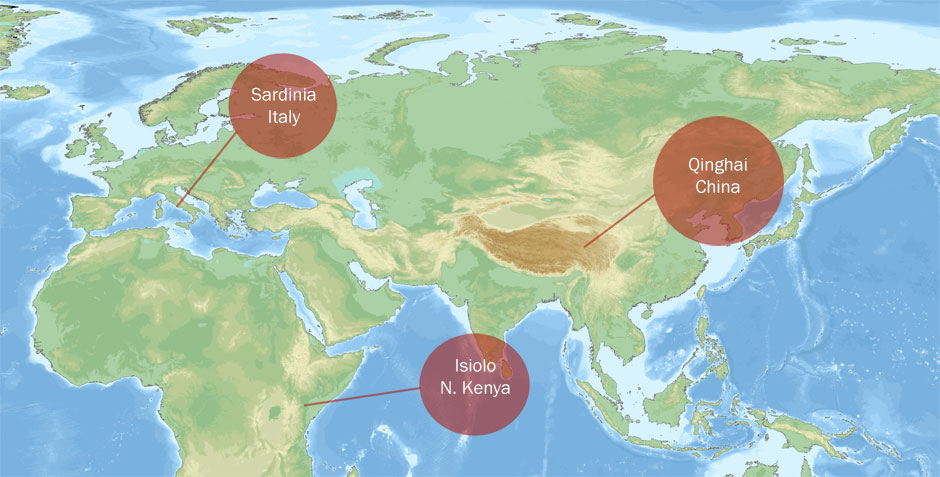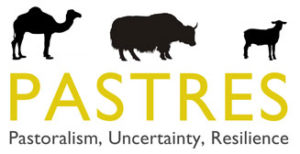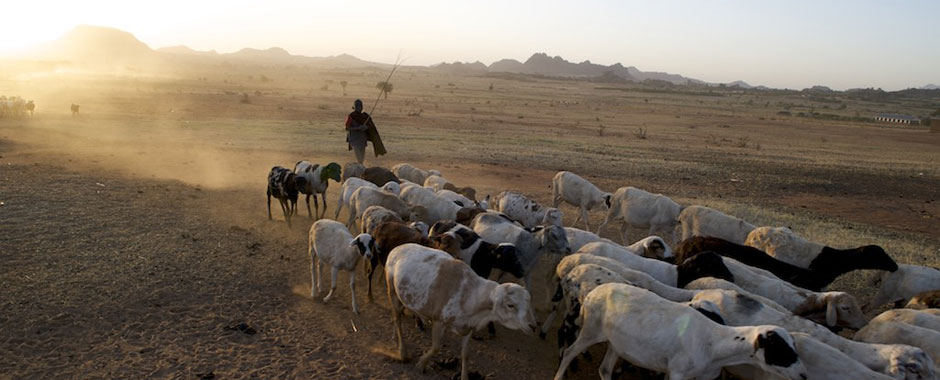by Ian Scoones and Michele Nori, PASTRES project
This month we are launching a new European Research Council funded project, Pastoralism, Uncertainty and Resilience: Global Lessons from the Margins (PASTRES) led by Ian Scoones (director of the STEPS Centre) and Michele Nori at EUI, Florence.
We are asking: What lessons can we learn for global challenges from pastoral systems responding to uncertainty? Together with local partners and students, we will be working in pastoral areas across three continents: China (Qinghai plateau), Italy (Sardinia) and Kenya (Isiolo), where we will be exploring responses to uncertainty across three areas: environment/resources, markets/commodities and institutions/governance.
Pastoral systems the world over are undergoing rapid change. As pastoral economies become linked into globalised networks of trade, as resources in low population density pastoral areas become valued by external investors (whether land, minerals, oil or gas), and as processes of privatisation, individualisation, sedentarisaton and territorialisaton extend, new social, economic and political configurations emerge in pastoral areas. Long-standing, traditional systems for responding to uncertainty must change too.
New conversations on uncertainty
Uncertainty – where we don’t know the array of outcomes or the probability of them happening – characterises most complex systems. While pastoralists have long learned to live with and from uncertainty, too often policies assume we are dealing with risk, where outcomes and their probabilities are known.
For example, many modelling approaches ignore uncertainties, constraining thinking and response options. Equally insurance, legal liability and early warning systems are all premised on risk management, where probabilities of outcomes are assumed. Such approaches can be dangerous when uncertain events emerge, dramatically refashioning system dynamics. Embracing uncertainty – and indeed ignorance, where we don’t know what we don’t know – is therefore essential.
This is especially so in the context of complex systems affected by uncertain events. Derivatives markets in financial systems, the impacts of climate change, globalisation of trade, sudden emergence of novel disease agents and the interconnections of people and economies through migration all have this effect.
Learning lessons from the pastoral ‘margins’, we aim to foster a conversation with other policy domains where uncertainty is pervasive – and where current institutions and policies are not responding effectively. Think the global financial crash, the West African Ebola epidemic, mass migration to Europe.
Through interactions with people working in different areas, whether bankers, climate change modellers, infrastructure engineers or public health specialists, we will be exploring what lessons can be learned from pastoral areas for financial systems, critical infrastructure, disease outbreak response, migration policy, climate change and conflict and security governance.
Interactions between quite different areas will hopefully open up a provocative conversation about responding to uncertainty in the modern age, informed by pastoralists’ experiences worldwide. Our new web pages offer some first thoughts on what some of the key questions are for different domains.
Three contrasting pastoral systems

We will be working in three sites. Each is characterised by different types of uncertainty.
In Qinghai, China, rapid economic growth, growing demand for animal protein by Chinese consumers and plans for long-distance trade are transforming the economic landscape for pastoralists. New solar energy initiatives and eco-tourism and biodiversity protection projects are changing land use and access. Government policies encouraging sedentarisation are transforming older, nomadic and transhumant systems, as pastoralists become incorporated into a new economy. Yet, pastoralism continues as an important livelihood for many, but under new contexts, with fresh threats as well as opportunities.
In Isiolo in Kenya, similar changes are afoot. Investments in minerals and energy development, combined with new infrastructural developments, are changing the region inhabited by Borana pastoralists. Conflicts over resources are heightened, as land becomes enclosed and less accessible. At the same time, demand for livestock products is booming, not only within the country but regionally and in export markets to the Middle East.
Strong global demand for Pecorino cheese structures the pastoral economy in Sardinia, Italy. But competing land-uses, from tourism as well as conservation, also has an impact on land use.
Understanding changes in resources, markets and governance arrangements as responses to both new and old uncertainties will be central to the project’s research.
Four objectives
 The PASTRES project has four interlinked objectives:
The PASTRES project has four interlinked objectives:
- Learning from pastoral areas to develop a novel cross-disciplinary theoretical framework for thinking and acting, focused on the relationships between uncertainty, resilience and development in the context of rapid change.
- Exploring responses to uncertainties in three contrasting pastoral settings in diverse geographical and agro-ecological settings – Asian highlands, African drylands and European islands.
- Facilitating a dialogue between marginal pastoral areas and others around fundamental challenges of risk and uncertainty across different domains, drawing out wider lessons.
- Developing the capacities of a team of PhD researchers and counterparts in three countries for policy-engaged, cross-disciplinary research and analysis, and developing a wider network across fields, all exploring uncertainty and resilience.
Our work will unfold over the coming five years. The team will be working closely with include Antonello Franca (CNR, Sassari, Sardinia, Italy), Gongburezen (Southwestern University, Chengdu, China) and Hussein Mahmoud (Technical University of Mombasa, Kenya), as well as three PhD students, who will be registered IDS at the University of Sussex, but will come from the three study regions. Look out for adverts for these studentships in mid-2018.
In order to keep in touch with the project, please subscribe to the blog via RSS, sign up to our mailing list and follow us on Twitter at @Pastres_ERC. Look out for more blogs on PASTRES in the coming weeks!
This post was first published on the PASTRES blog. Selected posts will be republished here – visit the PASTRES blog to read all the posts from the project.
